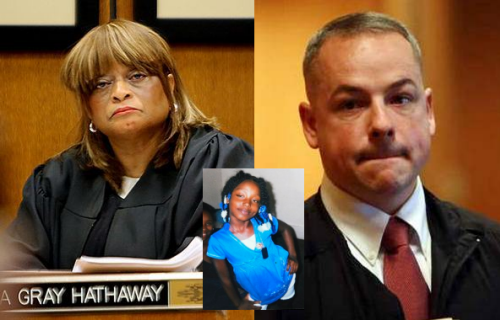Youtube video above posted by “Lady Justice,” who quoted Benjamin Franklin, “Justice will not be served until those who are unaffected are as outraged as those who are.”
“They are killing our people and it hurts my soul so much.”
“The officer openly lied in court and said the Grandmother physically attacked him.”
“We just witnessed a travesty of justice.”
Court scheduled for Mon. Oct. 6 8:30 A.M. in Weekley trial; Jones family supporters ask people to come
By Diane Bukowski
October 5, 2014
UPDATE: The Michigan Court of Appeals ruled late Oct. 3, “The Court orders, pursuant to MCR 7.205(E)(2), that plaintiff’s application for leave to appeal is HELD IN ABEYANCE pending the Court‘s review of the pleadings, and further proceedings are STAYED pending resolution of this appeal or further order of this Court.” Click on Weekley COA order to read order. VOD will provide updates as appeal proceeds.
DETROIT – Outrage is building nationally in the wake of Wayne County Circuit Court Judge Cynthia Gray Hathaway’s move to dismiss involuntary manslaughter charges against police officer Joseph Weekley for killing Aiyana Jones, 7, on May 16, 2010. Her ruling has been stayed pending a decision by the state Court of Appeals.
Many who have attended the trial called on the public to turn out in court Monday, Oct. 6 at 8:30 a.m. to let Judge Hathaway know they are watching. The Wayne County Prosecutor’s office confirmed that the jury will reconvene that day.
“They are killing our people and it hurts my soul so much,” said “Em” on the national Black website Madame Noire. “It was bad enough they were killing our men. Now it’s our women and kids and the babies. I can’t deal with this. I pray that God covers all of the people of color. It’s not safe for us.”
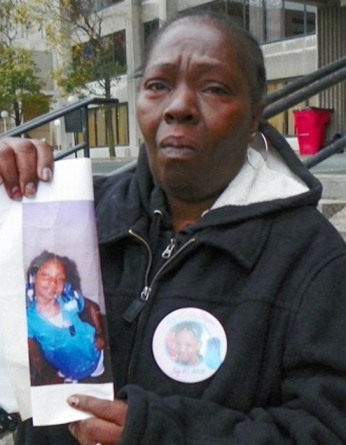
- Mertilla Jones, grandmother of Aiyana, weeps as she shows the child’s photo before hearing on the cop who killed her October 29, 2012.
Nat X said, “The same Officer openly lied in court and said the Grandmother physically attacked him upon entry. Which is a Felony [perjury]. His testimony was not backed up by other Officers who said they saw no one attack him or try to take his weapon and the discharge was not in fact accidental.”
Daniel Ferguson III of Detroit posted a photo of Hathaway on Facebook, remarking, “This is the face of a compromised kneegrow. She should be recalled now. WE JUST WITNESSED A TRAVESTY OF JUSTICE.”
Police brutality activist Ron Scott noted, “I think that the question of manslaughter, that’s what it was. This family has suffered for four years.”
When the charge was announced in 2011, many in the community called for a higher charge of second-degree murder to be brought against Weekley, but a one-man grand jury comprised of Wayne County Circuit Court Criminal Division Chief Judge Timothy Kenny authorized the manslaughter charge after lengthy investigation.
The Wayne County Prosecutor’s office confirmed Oct. 3 that a stay is in place on Hathaway’s ruling and that an emergency appeal has been filed with the state Court of Appeals, contradicting a report from the Detroit News that a decision to appeal had not yet been made.
“The [Wayne County Prosecutor’s Office] has filed an Application for Leave to File Emergency Interlocutory Appeal with the Michigan Court of Appeals,” Wayne County Asst. Prosecutor Maria Miller said in a release. “Because the jury trial is in progress no further comment will be made about the matter. The judge has instructed the jury to return to court on Monday, October 6, 2014.”
Meanwhile, Aiyana’s mother Dominika Jones posted photo after photo of her first-born child on her Facebook page, saying “Heyyyy Yannnnnaaaa! I miss you so much.” Her grandmother Mertilla Jones cried out, “My little princess!” when told of the attempt to dismiss the charges.
The same Detroit News article, by George Hunter, said without substantiation that Weekley is likely to serve no time on the misdemeanor charge of reckless discharge of a firearm resulting in death.
The applicable statute MCL 752.861(1) says however, “Any person who, because of carelessness, recklessness or negligence, but not wilfully or wantonly, shall cause or allow any firearm under his immediate control, to be discharged so as to kill or injure another person, shall be guilty of a misdemeanor, punishable by imprisonment in the state prison for not more than 2 years, or by a fine of not more than $2,000.00, or by imprisonment in the county jail for not more than 1 year, in the discretion of the court.”
Hunter also cited also a U.S. Supreme Court decision which he said bars appeal of a judge’s grant of a directed verdict, failing to note that Hathaway has stayed her ruling pending a COA decision.
The Feb. 2013 U.S. Supreme Court decision in Evans v. Michigan, upheld a trial judge’s directed verdict of acquittal of a man charged with burning a vacant home, saying a re-trial would subject him to “double jeopardy.” (Read full ruling at USC Evans v Michigan.)
However, the decision distinguished between directed verdicts based on “substantive” vs. “procedural matters,” with the latter not implying double jeopardy.
“Thus, an ‘acquittal’ includes ‘a ruling by the court that the evidence is insufficient to convict,’ a ‘factual finding [that] necessary establish[es] the criminal defendant’s lack of criminal culpability,’ and any other ruling which relates to the ultimate question of guilt or innocence,’ Justice Sonia Sotomayor wrote, citing a previous case.
“These sorts of substantive rulings stand apart from procedural rulings that may also terminate a case midtrial, which we generally refer to as dismissals or mistrials. Procedural dismissals include rulings on questions that ‘are unrelated to factual guilt or innocence,’ but which serve other purposes,’ including ‘a legal judgment that a defendant, although criminally culpable, may not be punished’ because of some problem like an error with the indictment.”
Paralegal Roberto Guzman has written many successful appellate briefs for Michigan prisoners.
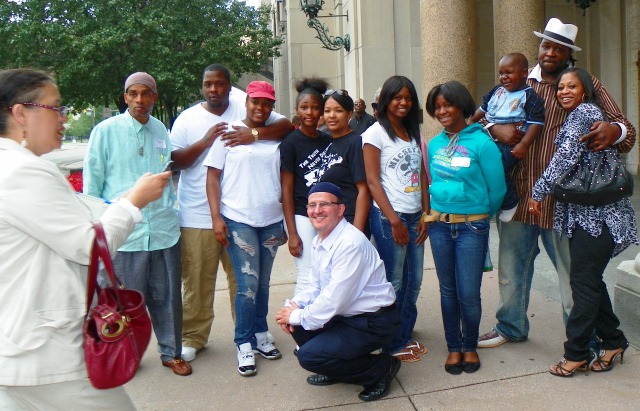
Davontae Sanford family and supporters after appeals court hearing August 6 Mother Taminko Sanford-Tilmon and stepfather Jermaine Tilmon at right. Sanford was convicted of four drug house murders that happened when he was 14, and his family is fighting to overturn his conviction because another man, Vincent Smothers, has confessed. Paralegal Roberto Guzman is in bottom center of photo. The Sanford-Tilman and Jones families earlier held joint protests about their cases.
He said, “Evans held that jeopardy bars retrial after a directed verdict midway through the trial even when the court grants a dismissal based on an erroneous element of a charged offense. We don’t have the same situation here that was present in Evans . . . . Instead Weekley’s situation is one where the judge dismissed the charge on the basis of the definition of ‘gross negligence’ found in the jury instructions; not on an element of the offense. So if the court of appeals is being asked to review the jury instruction I can’t see how that’s jeopardy for purposes of a retrial because it doesn’t appear to have been a dismissal on the element of the charge.”
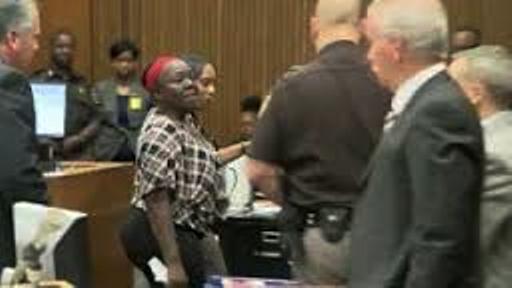
- Mertilla Jones tearfully tells Weekley, with his attorney Steve Fishman, “You know I never touched you, Officer Weekley.”
He added, “I can’t understand why Mertilla’s testimony alone would make or break the gross negligence standard. I would have thought the other officers’ testimony that Weekley violated protocol established gross negligence.”
Defense attorney Steve Fishman said in arguing for the directed verdict, “The only evidence that points to any kind of knowingly creating a danger or intending to cause injury, the only testimony is that of Mertilla Jones, which is by its nature and by comparison to the other testimony, including the medical examiner, is completely and totally unbelievable.”
However, the following testimony has also been given during the trial:
A weapons expert testified that Weekley’s MP5 submachine gun cannot be accidentally fired, that it takes 8-9 lbs. of pressure on the trigger to fire.
SRT member Sgt. Shawn Stallard, second into the house, testified he saw no struggle between Mertilla Jones, Aiyana’s grandmother, and Weekley. Weekley testified in his first trial that such a struggle caused his weapon to fire. Stallard said Weekley kept asking him what he saw.
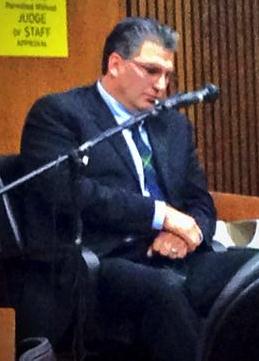
- Sup. Sgt. John Robert Collins was clearly still distressed by killing of 7-year-old Aiyana Jones as he testified this week. He said: “My life has not been the same since that night.”
SRT Sgt. Supervisor John Robert Collins testified that Weekley ran up to him on the porch of the house in after the shooting. “I had my MP5,” Collins said. “It was in a low ready position on a sling. I made contact with Officer Weekley in a frantic state. He was reaching and grabbing and clawing at my gun repeatedly with both hands; he appeared to be in shock. He kept saying, ‘She grabbed my gun.’ I made sure my gun was on safety, because I didn’t want it to go off. He said, ‘I shot her.’ I think what I said, because of the circumstances the only thing that came to mind was, ‘Tell the truth.’ We’ve been trained not to say everything will be OK. My family always told me when I was in trouble, ‘Tell the truth.’”
Numerous SRT members testified that they are repeatedly trained in trigger discipline and weapons retention, i.e. keeping one’s index (trigger) finger on the slide of the gun above the trigger even if someone tries to take the gun.
Fishman repeatedly demeaned Mertilla Jones’ testimony that Weekley entered, put his gun to Aiyana’s head, and fired. Wayne County Medical Examiner Carl Schmidt testified there was “no evidence of close-range firing” due to the lack of stippling around the wound. However, he added that in a case where the muzzle of a gun is placed directly against the head, there would also be no stippling. Numerous scholarly pathology articles support that.
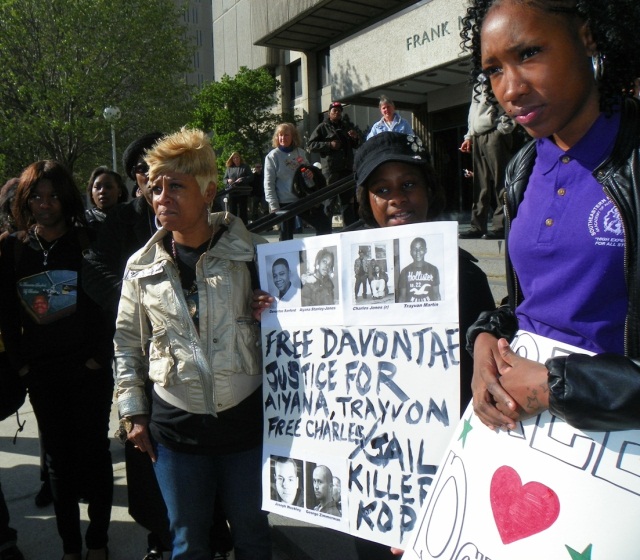
Taminko Sanford-Tilman (left) weeps at joint rally for justice for her son Davontae, Aiyana and Charles Jones, Travyon Martin April 23, 2013.
Related articles on this trial:

